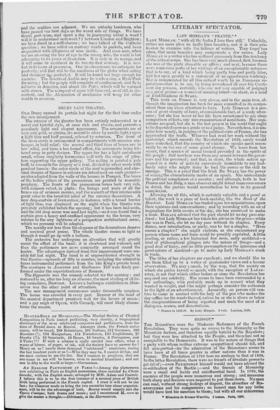LITERARY SPECTATOR.
LADY MORGAN'S • " FRANCE." *
LADY MORGAN, " with all thy faults I love thee still." Unluckily, critics are more alive do faults than beauties, and it is their pro- fession to examine into the failings of writers. They forget- too often, that many beauties may compensate a few errors. Lady MORGAN is a writer who has suffered grievously from this tendency of the critical corps. She has been very much abused, first, because she was of' the party abusable ex officio; and next, because there were numerous parts of her writings of an exceptionable nature— that is to say, of a kind which being partly true and partly false, laid her open greatly to a statement of an opprobrious tendency. She is remunerated for all this critical wrath by an European re- putation—that is to say, by being considered all over the Conti- nent (by persons, certainly, who are not very capable of judging) as a great genius—a woman of amazing talent—in short, as a kind of trishlMadame de STAEL.
This work on France is very clever, and in the main true, al- though the imagination has been far more consulted in its compo- sition than any close attention to facts. Lady MoitoAn is a per- son of great vivacity of fancy, of considerable tact, of a ready utter- ance; but she has never in her life been accustomed to any close comparison of facts, any nice examination of conditions. Her aspi- rations are good, but she is the last person in the world that ought to be depended upon as a guide or as a judge. Nevertheless, it is sin- gular how nearly, in judging of the political state of France, she has approached the truth. 'Whoever had read her work without the postscript, which records the Revolution of 1830, surely would have remarked, that the country of' which she speaks must neces- sarily be on the eve of some grand change. We learn from her report, that a species of moral turmoil prevailed in the spirits of the people ; that nowhere was there any accord between the gover- nors and the governed ; and that, in short, the whole nation ap- peared in a state of activity excessively formidable to any fool- hardy ruler who might fancy he had he power or the skill to manage. This is a proof that the Irish DE STAEL has the power of seizing the characteristic marks of an epoch. She understands the political complexion of a country ; and although, both in her France and her Italy, a nice observer might detect numerous errors in detail, the picture would nevertheless be true in its general complexion. Allowing for all this, which is certainly valuable and a proof of talent, the work is a piece of book-making, like the Book of the Boudoir. Lady MORGAN has traded upon her acquaintance, upon their opinions and conversations ; and by recording with an air of inspiration the little events of the day, she has contrived to make a book. HORACE advised that the poet should let no day pass sine ; but Lady MORGAN has taken his advice in the gross—while she was in Paris, she let no day pass without its chapter. Every dinner, new introduction, or party, was to her a chapter. "Here comes a chapter !" she might exclaim, as she encountered any person whose name and fame could be possibly eaVoited. A little reading, or rather, a few historical bon mots, sadly mutilated—a kind of philosophical glimpse into the nature of things—and a good deal of fancy, and no little presumption on the ignorance and good-nature of mankind—go to make up Lady MORGAN'S stock in trade.
The titles of her chapters are excellent; and we should like to see them filled up by a writer of profounder views and a keener observation. We may imiark, by the way, that the society on which she prides herself so much,-with the exception of LAFAY- ETTE, is not that which either before or since the Revolution has acquired any celebrity. She seems to have been surrounded by a few authorlings, who probably made up in conceit what they wanted in weight, and who might perhaps consider the authoress in the light of an advertisement. Assuredly, no person will ven- ture to come in contact with the lady of' the pen who makes the day suffice for the wants thereof, unless he or she is above or below the disagreeableness of being reported and made the most of in dialogues, scenes, and dissertations.
4, France in 1829-30. By Lady Morgan. 3 vols. London, 1830.


























 Previous page
Previous page